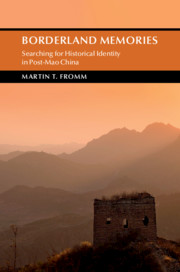Book contents
- Borderland Memories
- Cambridge Studies in the History of the People’s Republic of China
- Studies of the Weatherhead East Asian Institute, Columbia University
- Borderland Memories
- Copyright page
- Dedication
- Contents
- Acknowledgments
- Introduction
- 1 Reconfiguring Cultural Production in the Post-Mao Transition
- 2 Borderland Ambiguities in Narratives of Modernization and Liberation
- 3 Relocating the Nation outside the Nation
- 4 The “Historical Science” of Wenshi Ziliao
- 5 Affective Community and Historical Rehabilitation
- 6 Mobilizing a “Patriotic United Front”
- 7 Local, Regional, and National Dynamics of Wenshi Ziliao Production
- Conclusion
- References
- Index
- Studies of the Weatherhead East Asian Institute, Columbia University
7 - Local, Regional, and National Dynamics of Wenshi Ziliao Production
Published online by Cambridge University Press: 18 February 2019
- Borderland Memories
- Cambridge Studies in the History of the People’s Republic of China
- Studies of the Weatherhead East Asian Institute, Columbia University
- Borderland Memories
- Copyright page
- Dedication
- Contents
- Acknowledgments
- Introduction
- 1 Reconfiguring Cultural Production in the Post-Mao Transition
- 2 Borderland Ambiguities in Narratives of Modernization and Liberation
- 3 Relocating the Nation outside the Nation
- 4 The “Historical Science” of Wenshi Ziliao
- 5 Affective Community and Historical Rehabilitation
- 6 Mobilizing a “Patriotic United Front”
- 7 Local, Regional, and National Dynamics of Wenshi Ziliao Production
- Conclusion
- References
- Index
- Studies of the Weatherhead East Asian Institute, Columbia University
Summary
Reconstructing the past involved the reconsolidation of the post-Mao party-state’s bureaucratic apparatus through the systematic mobilization of state agencies and social organizations at the county, regional, provincial, and national levels. The balance between cross-departmental cooperation, differentiation, and specialization in the administrative organization of wenshi ziliao contributed to the production of locally distinctive accounts of commercial vitality and colonial flavor that resonated with the multifaceted nationalist and market reform agendas of post-Mao historical identity. These tensions were evident in the vertical relationships between wenshi ziliao offices at the county, provincial, and national levels. The national PPCC leadership’s policy of devolving responsibility to the local level was intended to drive national political reintegration from the bottom up, yet it also promoted the strengthening of local and regional identities whereby the goal of national reconsolidation became remobilized for the regional project of revitalizing a distinctive northeast/Manchuria historical consciousness. Wenshi ziliao practices of knowledge production, memory politics, and identity formation, balancing grassroots-based practices with top-down hierarchical control, speak to flexibility and resilience in post-Mao governance strategies.
Keywords
- Type
- Chapter
- Information
- Borderland MemoriesSearching for Historical Identity in Post-Mao China, pp. 223 - 254Publisher: Cambridge University PressPrint publication year: 2019

